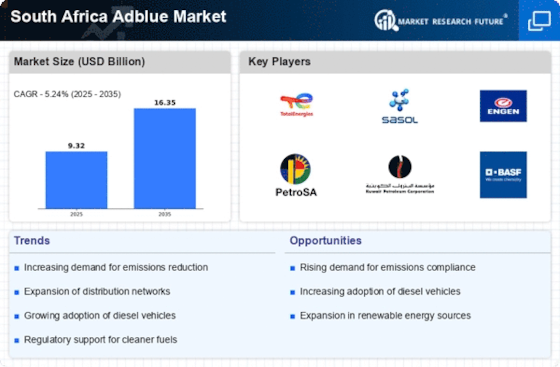Market Trends
Key Emerging Trends in the South Africa AdBlue Oil Market
The market trends of South Africa's AdBlue oil market reflect the country's growing focus on environmental sustainability and compliance with emissions regulations. AdBlue, also known as diesel exhaust fluid (DEF), is a urea-based solution used in vehicles equipped with selective catalytic reduction (SCR) systems to reduce nitrogen oxide emissions. In recent years, there has been an increasing demand for AdBlue in South Africa, driven by stricter emissions standards and a greater awareness of environmental issues.
The South Africa Adblue Oil Market share can be increased by making the most of the available market opportunities. With the rising number of vehicles on the streets, the demand for South Africa Adblue Oil could further expand during the forecasted period. The COVID-19 pandemic has also revolutionized the business landscape and it has created new opportunities that the industry players can exploit.
One of the key market trends in South Africa's AdBlue oil market is the growing adoption of SCR technology in commercial vehicles. As the government imposes stricter emissions regulations, trucking companies and fleet operators are increasingly investing in SCR-equipped vehicles to ensure compliance. This has led to a corresponding increase in demand for AdBlue, as SCR systems require regular refills of the fluid to function effectively.
Another important trend is the expansion of distribution networks for AdBlue products across South Africa. As demand for AdBlue grows, suppliers and distributors are working to ensure that the product is readily available to customers nationwide. This includes expanding the number of retail outlets, establishing partnerships with automotive service providers, and offering convenient packaging options such as bulk delivery and portable containers.
In addition to commercial vehicles, there is also a growing market for AdBlue in passenger vehicles and off-road machinery. As consumers become more environmentally conscious, there is increasing interest in vehicles equipped with SCR technology, particularly among urban commuters and environmentally conscious consumers. This has contributed to the steady growth of the AdBlue market in South Africa, with manufacturers and distributors targeting both commercial and consumer segments.
Price competitiveness is another significant trend in the South African AdBlue market. As the market matures and competition increases, suppliers are under pressure to offer competitive pricing and value-added services to attract and retain customers. This has led to price wars and promotional activities, as well as the introduction of loyalty programs and discounts for bulk purchases.
Furthermore, there is a growing emphasis on product quality and reliability in the AdBlue market. With the critical role that AdBlue plays in reducing emissions and ensuring regulatory compliance, customers are increasingly demanding high-quality products that meet industry standards. Suppliers are responding by investing in quality control measures, certification processes, and product testing to reassure customers and differentiate themselves in the market.
Sustainability and environmental stewardship are also driving market trends in the AdBlue oil market in South Africa. As concerns about air pollution and climate change continue to escalate, there is a growing demand for eco-friendly products and sustainable business practices. Suppliers are responding by offering AdBlue products that are manufactured using renewable energy sources, minimizing packaging waste, and promoting responsible disposal and recycling practices.
Overall, the market trends in South Africa's AdBlue oil market reflect a shifting landscape shaped by regulatory changes, technological advancements, and evolving consumer preferences. As the country continues to prioritize environmental sustainability and emissions reduction, the demand for AdBlue is expected to remain strong, driving further innovation and investment in the industry.





Leave a Comment